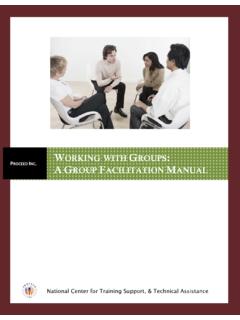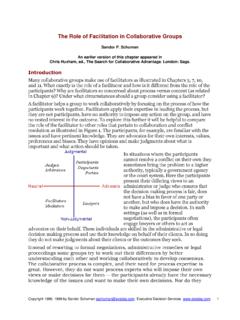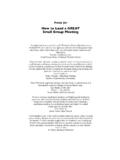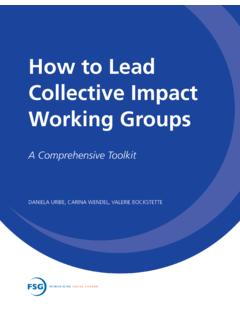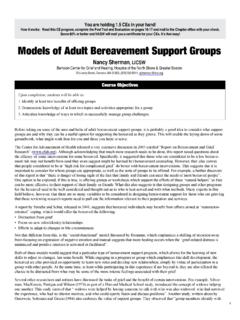Transcription of Methodology Brief: Introduction to Focus Groups
1 Methodology Brief: Introduction to Focus Groups Barry Nagle Nichelle Williams 1. This Methodology brief outlines a five-stage process for conducting Focus Groups and reporting on the results. The five stages are: Study Purpose Methodology Conceptualization Logistics facilitation Preparation Pre-Session Session Analysis Reporting Using this five-stage process as a guide will contribute to the completion of an impactful Focus group . This brief serves as an Introduction to Focus Groups . Sources for more comprehensive information can be found in the resource section. Why Focus Groups ? Focus Groups provide insights into how people think and provide a deeper understanding of the phenomena being studied.
2 While a valuable research tool, surveys generally ask closed-ended questions that may limit the feedback that can be gained from a respondent. A method to gain more in-depth information to supplement surveys is interviews; conducting interviews, however, can be an expensive proposition that can exceed the available resources. Focus Groups are group interviews that give the researcher the ability to capture deeper information more economically than individual interviews. Economy is an important benefit but there are other benefits of Focus Groups when compared to interviews. group interaction and non-verbal communication are primary benefits of Focus Groups .
3 group interaction between members of the target population during Focus Groups may encourage participants to make connections to various concepts through the discussions that may not occur during individual interviews. A skilled facilitator can encourage these group interactions to capture this data to provide a more comprehensive understanding of what is being studied. Non-verbal communication is also data that can be captured in Focus Groups . Participants within a Focus group may respond very differently to a topic. A topic related to gender equity, for example, may provoke intense discussion among female participants while male participants withdraw from the discussion.
4 This type of interaction is observation data for analytical purposes. Focus Groups can be integrated into an overall study design or can occur individually when a specific topic is being explored. This Methodology brief focuses only on Focus group design and will not discuss its integration into an overall study. Stage One: Study Purpose As with any research study, the first stage in conducting a quality Focus group is to define the study purpose. This is critical as it defines how all subsequent activities will proceed. Sample purposes for a Focus group include: Exploration: Finding out about an issue of importance from the target population Program Development: Asking members of the target population what types of activities they would enjoy Systematic Research: Collecting in-depth data on specific research questions Evaluation: Collecting in-depth data on specific evaluation questions to determine program success or progress Stage Two: Methodology The Methodology stage has two elements: 1) Conceptualization and 2) Logistics.
5 The conceptualization of a Focus group follows a process similar to a classic research study. Conceptualization Once the study purpose has been defined, the study population and sample have to be defined. The population represents the individuals that are to be analyzed. The sample is a subset of the population. Focus Groups do not use probability or random samples. Focus Groups generally utilize convenience sampling. The sample for a Focus group has individuals with characteristics of the overall population and can contribute to helping the research gain a greater understanding of the topic. A Focus group is most effective with 7-12 participants.
6 This is the optimal size to promote discussion and enable the facilitator to keep the group on task. An optimal Focus group has approximately five questions; in the development stage the researcher should brainstorm to develop a list of questions and then prioritize which questions are of most importance. The questions should be open-ended because the intent of the Focus group is to promote discussion. Yes/No questions or questions that are too specific can limit discussion and decrease the value of a Focus group . A sample of an open-ended question would be What do you think of this story? This question promotes discussion about the story.
7 A close-ended question such as Did you like the story? does not promote discussion. After selecting the most important questions, order them into a logical flow and develop prompts for each question. A prompt is a question that can facilitate discussion if there is not a good response to the initial question. Also develop probes 3. which are questions that explore an issue more in depth. After finalizing the questions, review the questions to ensure that they are aligned with the study purpose. Sometimes in the Methodology stage, a research team can become so enmeshed in developing questions and ideas that the final questions can lose their alignment with the study purpose.
8 As a quality check, always take a step-back to ensure that the questions that are asked will inform on the study purpose. The final stage in question development is to pilot test the questions with individuals that have the same characteristics as your population. This will inform on whether any changes are needed in the questions. Logistics The logistics are often the most time-consuming element of preparing to conduct a Focus group . Below is a suggested schedule for planning a Focus group : Task Time before actual group Develop the Study Purpose 6-8 Weeks Identify the Participants 6-8 Weeks Develop Participant Contact List 6-8 Weeks Select the Facilitator 4-5 Weeks Question Development 4-5 Weeks Develop the Script 4-5 Weeks Pilot test questions and script.
9 Revise 4 Weeks as necessary Dependent on the Institution. If Obtain IRB Approval this takes more than a month, start the process earlier. Identify and reserve Focus group site 4 Weeks Invite Participants 3-4 Weeks Verify Invitation to Participants by 2 Weeks Phone If there are multiple facilitators, conduct a training on the script to 2 Weeks promote study reliability Finalize Room Arrangements 1 Week Reminder Call to Participants 2 Days Organize all Needed Materials 2 Days While starting planning 6-8 weeks prior to the actual Focus group may seem like a long time, it is important for the research team to engage in a thoughtful process.
10 This time span allows the researcher to make adjustments as needed. When selecting participants, attend to the level of the participants; do not invite a supervisor to sit in the same group with his/her subordinates. If a supervisor or someone else who is in charge of the rest of the participants is invited to the group , 4. the group interaction will change and negatively impact the utility of the Focus group results. Selecting the facilitator is important. If no one on the research team is comfortable in front of Groups or has the ability to encourage group interaction, use an external person that has experience in facilitating Groups .

